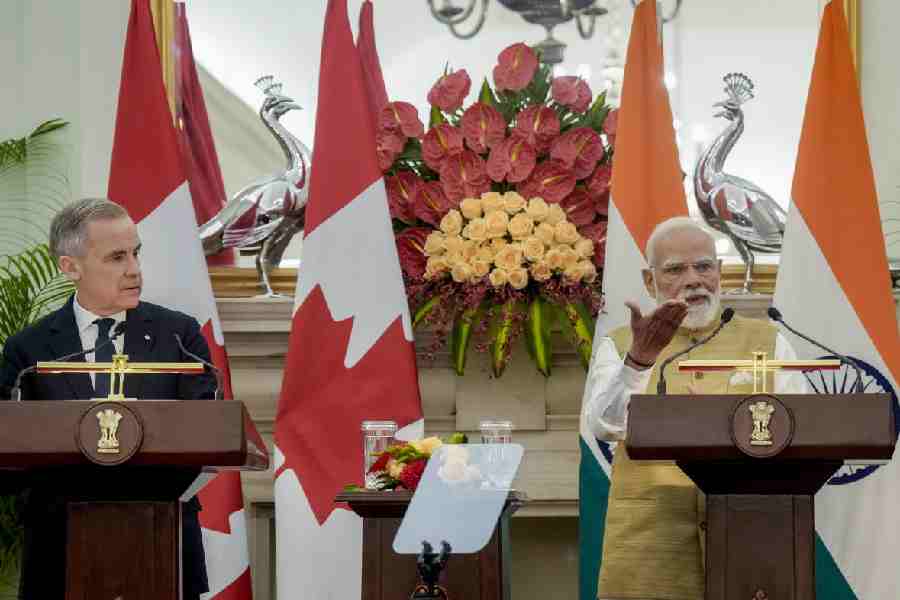 |
| Germany’s Katrin Holtwick (right) spikes the ball as Brazil’s Juliana tries to block it during the women’s preliminary round beach volleyball match in London. (Reuters) |
London, July 30: A male Swedish journalist (sort of) protested to a newspaper: “That’s just sex.”
The paper agreed it was: “Just flesh. Lots and lots of it, everywhere you look, from 9am until midnight.”
Ticket holders would probably demand their money back if it weren’t. And today, Boris Johnson, the mayor of London, has used his weekly column to endorse the attractions of beach volleyball. Or, at least, beach volleyball played by attractive women wearing the skimpiest of bikinis.
London is not held back by the lack of a beach. Tonnes of sand have been heaped on Horse Guards Parade, barely a minute’s walk from 10 Downing Street, to create the perfect beach volleyball venue for London 2012.
“When Olympic tickets went on sale in the ballot, beach volleyball was one of the most oversubscribed events, second only to the 100 metres final,” noted the Daily Mail.
“A year on, it remains the hot ticket of the Games. Or, at least, the women’s beach volleyball does. No one seems quite so interested in the men.”
This morning Boris enthused: “As I write these words there are semi-naked women playing beach volleyball in the middle of the Horse Guards Parade immortalised by Canaletto.
“They are glistening like wet otters and the water is plashing off the brims of the spectators’ sou’westers. The whole thing is magnificent and bonkers.”
Sex sells
After the exertions of beach volley, young men and women probably don’t have too much energy left for anything else. But that is apparently not the case.
There is probably a poster outside the Indian quarters in the Games village which warns: “No sex — or medals — please, we’re Indians.”
But the consensus is that not everyone is so virtuous.
The Huffington Post reports: “Tales of shenanigans at the living quarters for 10,000 super-fit young men and women have always abounded, and London doesn’t look as if it will be any different... and some newly arrived athletes say they can hardly wait for the fun to begin.”
“The Olympics is the height of your career, so you might do some things you don’t usually do,” British beach volleyball player Shauna Mullin said with a giggle.
Most, like Mullin, will stop themselves from going too far, aware they’re in the international spotlight.
But the man overseeing the health of the Brazilian team takes a relaxed view. “Sex is common at the Olympics. It’s necessary. It’s natural,” asserted Dr Joao Olyntho Machado Neto. “If you are going to be healthy people, why not make sex? Brazil is very tolerant with sex as a country. We don’t have Victorian minds and we’re not religious.”
British organisers are being practical. “Thousands of free condoms will be available. Organisers have heard enough about village antics from previous Games to know there will be heavy demand by athletes for contraception.”
The Mirror’s intrepid reporters have conducted adequate research on the subject.
Their conclusion?
“The booze flows, international relations are improved over a few bottles of whatever someone can get their hands on and inevitably one thing leads to another.”
Home team chokers?
Conventional wisdom decrees that the host country enjoy its home team advantage.
But the failure of Mark Cavendish to get gold for Britain in cycling, when he was thought to be a cert, suggests there may be something in Raj Persaud’s chokers’ theory: “Could Team Great Britain suffer a psychological disadvantage in the Olympics from being the host nation? The latest sports psychology research uncovers a home ‘choke’ effect.”
Raj, a well-known psychiatrist, draws my attention to a paper he has written with colleague Adrian Furnham: “This is a startling finding, because until now, academic sports psychology has generally found a considerable ‘home advantage’ effect. Research evidence that athletes and teams perform better at home, compared to away, applies across a range of sports, including studies on premiership soccer, North American football, basketball, baseball, hockey and baseball.” Against that is the burden of expectation.
The latest research from a team of psychologists at McMaster University in Ontario “suggests that a normal home advantage for most kinds of competitive sports turns into a ‘home disadvantage’ effect, when dealing with particular sporting predicaments. These are specifically high stakes events, such as when an Olympic medal is at stake.”
This is termed the “home choke effect” — which might explain why Indian cricketers often underperform at home.
Naked truth
In the exhibition on the Olympics at the Royal Opera House, an useful piece of intelligence is offered in the section dealing with the Games when they began in ancient Greece in 776 BC.
Under “nudity”, the curators say: “The word ‘gymnasium’ comes from ‘gymnos’, which means ‘naked’ in Greek. Athletes competed nude to illustrate the harmony between body and mind.”
Perhaps that is why beach volleyball is closer to the noble ideals of the ancient Olympics.











